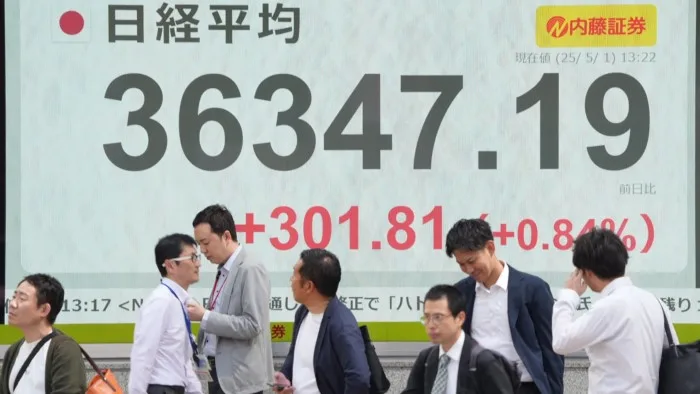This article is an on-site version of our FirstFT newsletter. Subscribers can sign up to our Asia, Europe/Africa or Americas edition to get the newsletter delivered every weekday morning. Explore all of our newsletters here
Good morning, and happy Friday. Here’s what we’re covering today:
-
Hopes for a thaw in the trade war
-
Donald Trump’s Latin American fan club
-
How the US-Ukraine minerals deal was struck
-
And the ‘strange beauty’ of dying at home
Signs of a possible thaw in US-China trade tensions have helped drive global stock markets higher today after Beijing said it was “evaluating” recent overtures from Washington on starting trade talks. Here’s what you need to know.
China’s commerce ministry said the US had recently “conveyed messages to China through various channels, expressing a desire to engage in discussions”. The ministry spokesperson said earlier today: “China is currently evaluating this.” Friday’s statement marks a slight softening of Beijing’s stance from last week, when it said Washington would need to drop its steep levies on China for talks to begin, and was first signalled yesterday by a social media account tied to state broadcaster CCTV.
What has been the investor reaction? Global equities rallied, with Taiwan’s Taiex climbing 2.7 per cent, Hong Kong’s Hang Seng index rising 1.8 per cent and Europe’s Stoxx 600 index gaining 1 per cent. S&P 500 futures climbed 0.5 per cent. The Wall Street benchmark has been buoyed by strong Big Tech earnings this week and is on the brink of erasing all of its losses since Donald Trump’s “liberation day” tariff blitz on April 2 sent global markets into a tailspin. “The peak of uncertainty may be over,” said Wee Khoon Chong, a senior strategist at BNY. Asian currencies rallied against the dollar on signs of easing trade tensions. This story has the latest market prices in the lead up to Wall Street opening.
-
Opinion: If tariffs stay in place, US companies will be in sore need of funds to pay the bills and prepare for other potential shocks, writes Gillian Tett.
Here’s what else we’re keeping tabs on today and over the weekend:
-
Economic data: The US government releases monthly employment data later. Economists expect the number of new job openings to have slowed last month compared with March but the unemployment rate to remain at 4.2 per cent.
-
Trump’s tariffs: The “de minimis” exemption for small packages from China closes today and a 25 per cent duty on car parts takes effect tomorrow.
-
Results: Chevron, ExxonMobil, DuPont, T Rowe Price and Cboe Global are among the companies reporting earnings today. HSBC holds its first annual meeting under new chief executive Georges Elhedery and Berkshire Hathaway has its AGM tomorrow.
-
Elections: Australia and Singapore go to the polls on Saturday. Romania’s presidential election takes place on Sunday.
How well did you keep up with the news this week? Take our quiz.
Five more top stories
1. Apple chief executive Tim Cook has warned that Donald Trump’s tariffs will increase costs by $900mn in the current quarter. Apple shares fell 2.75 per cent in after-market trading after Cook’s remarks to analysts. Here’s more on the impact tariffs had on Apple’s results.
-
Amazon: The online retailer’s shares also fell in after-hours trading after it released lower than expected guidance for the current quarter.
-
Microsoft: The software group has emerged as the winner from Big Tech’s first earnings of Trump’s new term. Here’s why.
2. Eurozone inflation remained at 2.2 per cent in April, surpassing expectations and complicating the European Central Bank’s task as it considers whether to cut interest rates further at its next meeting in June. Economists had predicted that the figure would fall to 2.1 per cent in April. Here’s more on the outlook for Eurozone interest rates following today’s inflation numbers.
3. Nigel Farage claimed his rightwing populist Reform party was now Britain’s main opposition to Sir Keir Starmer’s government after winning the Runcorn & Helsby by-election, ousting Labour by just six votes. The result capped a night of extraordinary advances by Farage’s party in local elections across the UK.
4. Large pension funds and other big institutional investors have started to borrow against their private equity portfolios to raise cash after a slowdown in dealmaking and public offerings has dimmed their hopes of exiting trillions of dollars in ageing deals. The stockpile of unsold private equity deals hit a record $3tn last year, according to Cambridge Associates. Read more on the growing demand for so-called net asset value loans on Wall Street.
5. Israeli jets struck near Syrian President Ahmed al-Sharaa’s palace this morning in what Benjamin Netanyahu said was a message to Damascus after a wave of sectarian violence involving the Druze minority. The attack marks another escalation in Israel’s military intervention in Syria. Here’s the latest from Malaika Kanaaneh Tapper in Beirut.
How should central banks navigate the new world order? Pose questions to Chris Giles and other FT experts about monetary policy, and have them answered in a live Q&A next Wednesday.
The Big Read
As Donald Trump unravels the global trade system and publicly criticises the Federal Reserve, investors more broadly are starting to question the haven status of the dollar and Treasuries — assets that have long formed the bedrock of China’s $3.2tn in foreign reserves. Here’s how Beijing is quietly diversifying from US government bonds.
We’re also reading and listening to . . .
Chart of the day
As US factories struggle to find workers, with half a million jobs remaining unfilled in March, the Trump administration has envisaged robots taking up the slack. Industry experts are sceptical, citing several barriers to a rapid acceleration in automation.
Take a break from the news
Mónica Manzutto, the co-founder of Mexico City’s Kurimanzutto gallery, was born in Colombia but moved to Mexico and settled in the capital. She shares her favourite shops, markets and places to eat mole in her insider’s guide.



